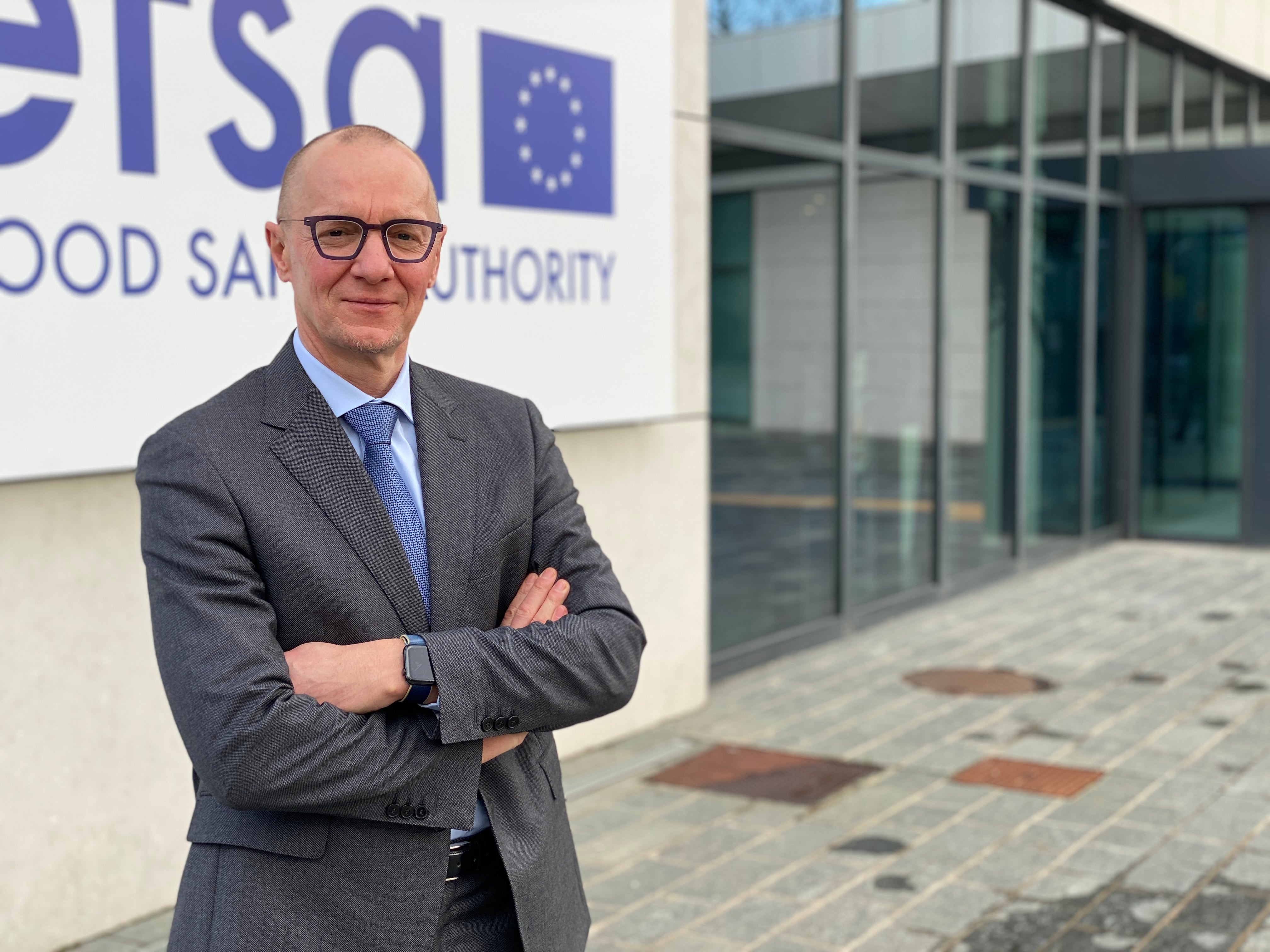Bernhard Url’s job has grown increasingly complex. More so than he might have imagined possible on joining the European Food Safety Authority (EFSA) as director of risk assessment and scientific assistance 13 years ago.
Some of the added complexity is undoubtedly due to his quick succession up the ranks to executive director, a role he climbed to just over two years after joining and one he’s held for 11 years.
Most of the stresses however are certainly a result of the increasingly complex challenges food and drink – and by extension, EFSA – is facing.
Being such an essential industry, there’s little food and drink isn’t impacted by. As a result, Url’s key focuses are improving the core functions of EFSA – risk assessments and approvals – as well as assisting the industry in overcoming climate and environmental threats, improving animal welfare and being proactive on emerging risks.
But the organisation can only do this if it continues to protect the three core values Url has worked to bolster in his decade at EFSA: trust, independence and collaboration.
The success of EU food exports is partly due to this stamp that you get, it’s safety assessed in Europe
Bernhard Url, EFSA executive director
“Trust is important because we have to deliver good science,” he says. “Independence is something that‘s very close to our hearts and hardwired into our DNA – I think it‘s an outcome of mad cow disease, where EFSA was a vital part of controls."
Collaboration, however, is the thing that allows EFSA to carry out the bulk of its workload. “It‘s the main feature of ESFA, because we need this from the Member States to work.”
Confident the three pillars of EFSA are working, Url believes the agency is ready for further transformation, specifically in evolving the agri-food system in the EU towards something that‘s more sustainability focused.
“It might not be as high on the political agenda as it was five years ago, but it‘s needed and we need to discuss the pace and speed it‘s being done,” he believes.
Significant investment is needed to support a more sustainable food system, including the development of new pesticides and feed additives that align with the EU’s rigorous standards for human and environmental safety.
“This sort of innovation needs to be assessed and that‘s a big challenge for EFSA, so we have to be prepared for new processes and products coming onto the market,” he says.
EFSA’s legal obligation
However, it‘s EFSA’s legal obligation to be prepared to tackle emerging risks and to create new procedures that anticipate upcoming needs, mostly due to things like climate change and biodiversity losses.
So far, and as someone who has a self-declared bias towards the organisation, Url argues EFSA has proven itself to be a success story.
“The fact that safety assessments are done on an EU level and not national is an enormous advantage to all Member States,” he says. “For industry, there’s a market with the same food standards and as an industry it has the highest standard in the world.”
Url is so confident in EFSA’s ability that he says the success of the EU’s food export is partly due to EFSA’s “safety assessed in Europe” stamp.
Though there are many external factors biting at EFSA’s work, particularly when it comes to climate. But what about geopolitics?

“It‘s still to be seen what the whole turmoil of the new administration in the US will mean for trade in Europe,” says Url. “The risk from organisms hasn’t changed, but it could if global trade comes to a halt. The risk of imported plant pests would then be reduced, but that‘s not happening.”
Geopolitics might not be causing Url a headache, but environmental factors are.
“I think we tend to focus the discussion on climate change only. But if you look closely, it‘s climate change, pollution and biodiversity losses that are a threat to food. We’re dealing with all three of these threats for our planet.”
Climate change is not only hampering crops, it‘s allowing diseases from other parts of the world, such as Africa, to come to Europe as the heating environment is less hostile to various insects and bugs.
“We also have droughts and only recently there are enormous droughts in Europe which means we have to think about more drought resistant cultivars in crops, which isn’t our area but they will have to be risk assessed,” he explains.
More EFSA resource is having to be funnelled into tackling these areas, but it takes time to deliver impact assessments and then collaborative solutions. One example Url gives is the European Commission’s mandate to EFSA on how pesticides influence biodiversity. The guidance document will be researched and prepared, but it will take years until Member States have it.
Speed of novel food approvals
And speed is a word thrown at EFSA repeatedly, or lack of, especially when it comes to novel food approvals. A cohort of speciality food businesses recently joined forces to criticise the organisation, calling on those with skin in the game to give feedback on EFSA in an European Commission review of the agency.
The evaluation is still ongoing and won’t be concluded until next year. While Url doesn’t have any insights on the results so far – or perhaps won’t say if he does – the executive director has an inkling of what might come from the review.
“I’m convinced that it will be a good outcome,” he hypothesises. “There will be the desire from the industry for EFSA to be faster and more reactive. I won’t be surprised if this is the outcome, and maybe calls for more applicant support.”
A need for more EFSA communication to industry would also likely come from the review. Ask what the worst outcome would be, he says: “The stakeholders would say that we’re redundant.”
However, he doesn’t believe that will be a conclusion.

With his foresight on the potential criticisms to come from the review, what is Url doing to make improvements to speed, especially around novel food approvals?
EFSA has been undergoing a big speed risk assessment for the past two years, the processes and management, we’re looking at what we can do on all of these,“ he says.
However, he does point out that speed can be influenced by the entity submitting a novel food application, saying sluggishness is often the result of applications that have been poorly put together.
“On novel foods, we get applications of low quality and we have to stop the clock and have to go back and forth for additional information,” he explains.
“It makes the applicants unhappy, so there’s a dual obligation to speed up this process.”
So, the job doesn’t get any easier. But 13 years in and Url continues to be EFSA’s biggest champion and backs the organisation’s importance.
Quickfire questions
What's the one piece of tech that will change food and drink for the better?
I don’t think it’s tech. I think it’s attitude, both suppliers and consumers have to change to move towards more sustainable production and consumption.
What's an area of untapped opportunity for EU food and drink?
Sustainability. The benefit is we come closer to the true costs of food with less health repair and environment repair costs and we could pay farmer and food businesses more for products.
One piece of advice for novel food approval applicants
Talk to us, make sure that the applications are fit for purpose. We could do more for applicants, but they’re not accessing the support. We are reaching out to the industry to show how we can support.


